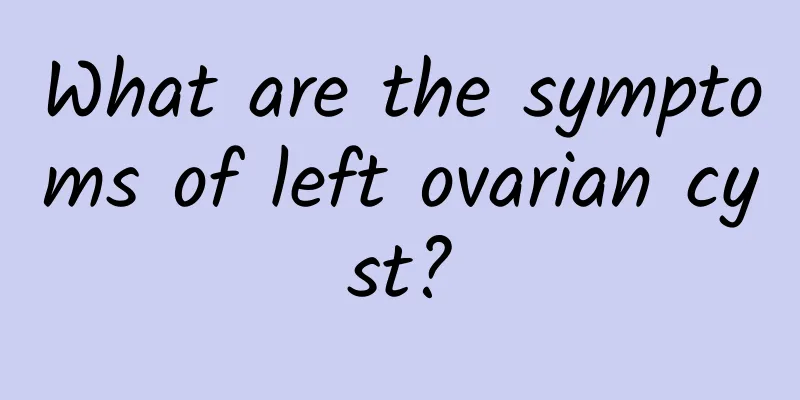What are the symptoms of left ovarian cyst?

|
Ovarian cysts are a type of ovarian tumor. Although the ovaries are small, they are functional and can produce eggs and steroid hormones. Therefore, treatment is the top priority. So what are the symptoms of left ovarian cysts? Are the symptoms obvious? In fact, left ovarian cysts have no obvious clinical manifestations in the early stage. Patients are often found during gynecological examinations for other diseases. As the tumor grows, its symptoms and signs vary depending on the development of the nature of the tumor. The main symptoms of left ovarian cyst are as follows: Abdominal enlargement and swelling: This is the most common phenomenon in the main complaint. Before noticing the enlargement of the abdomen, patients notice that their clothes or belts look tight, or they feel it occasionally in the morning. They find that there is swelling and bloating discomfort in the abdomen according to the abdomen. Lower abdominal discomfort: For the initial symptoms before the patient touches the lower abdominal mass, due to the weight of the tumor itself and the influence of intestinal peristalsis and posture changes, the tumor moves in the pelvic cavity, involving its pedicle and pelvic infundibulum ligament, causing the patient to feel swelling and drop in the lower abdomen or bone fossa. Menstrual disorders: Generally, ovarian or even bilateral ovarian cysts do not cause menstrual disorders because they do not destroy all normal ovarian tissues. Some uterine bleeding is not caused by endometrial congestion caused by endocrine or ovarian tumors; or other secretory effects caused by direct metastasis of ovarian malignant tumors to the endometrium. Compression symptoms: Huge ovarian tumors can cause dyspnea and palpitations due to compression of the diaphragm. Ovarian tumors combined with a large amount of ascites can also cause this symptom; but some ovarian tumor patients' dyspnea is caused by unilateral or bilateral pleural effusion; and it is often combined with ascites to form the so-called Meigs syndrome. Abdominal pain: If the tumor is uncomplicated, pain is rare. Patients with ovarian tumors may experience abdominal pain, especially if it occurs suddenly, with multiple pedicle torsion, or if the tumor ruptures, bleeds, or becomes infected. Abdominal pain and leg pain caused by malignant cysts often cause patients to seek emergency medical attention. |
<<: Three criteria for uterine fibroids requiring surgery
>>: Consequences of severe cervical erosion
Recommend
What is the best treatment for hyperprolactinemia?
I believe that many patients with hyperprolactine...
Expert analysis: Seven life details that effectively relieve dysmenorrhea
How to effectively relieve dysmenorrhea? Dysmenor...
Will adding dragon fruit to milk cause poisoning? Nutritionist reveals the truth! Dragon fruit is high in sugar and potassium, these people should pay attention
There is a rumor on the Internet: "Dragon fr...
How to effectively prevent female vaginitis?
Many women do not have enough knowledge about vag...
Teach you how to prevent cervical erosion. Two causative factors of cervical erosion.
Gynecologists say that cervical erosion is a prev...
How to stay away from uterine fibroids?
How to prevent uterine fibroids? Many female frie...
What causes pelvic inflammatory disease in women
The causes of female pelvic inflammatory disease ...
Who is prone to cervical erosion?
The following groups of people are at high risk o...
What are the complications of irregular menstruation?
There are many causes of irregular menstruation, ...
Which hospital can treat pelvic peritonitis?
Pelvic peritonitis is a serious clinical disease,...
Fever can cause abnormal vaginal discharge
Fever may cause abnormal vaginal discharge. The m...
Can you get heatstroke in winter? 3 tips for first aid when you faint while running
Run for love, do what you can! A 32-year-old groo...
The 5 most effective morning exercises to lose fat and slim your waist and abdomen
[Key Points]: Exercising in the morning is most e...
What are the precautions for ovarian cysts
As a woman, are you troubled by these situations:...
Can Motherwort Granules help expel lochia? What should I pay attention to when taking Motherwort Granules?
For women, Yi Mu Cao Granules should be familiar ...









